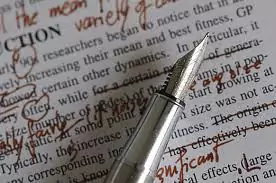 Editing is an essential part of the writing process. While you might have expressed brilliant ideas in your piece of writing, if many technical errors are included and your writing is not organized, your point will not reach your readers. In order for others to see your concepts clearly, you should trim your writing so that it becomes perfect not only in its content, but also in its technical performance.
Editing is an essential part of the writing process. While you might have expressed brilliant ideas in your piece of writing, if many technical errors are included and your writing is not organized, your point will not reach your readers. In order for others to see your concepts clearly, you should trim your writing so that it becomes perfect not only in its content, but also in its technical performance.

✅ AI Essay Writer ✅ AI Detector ✅ Plagchecker ✅ Paraphraser
✅ Summarizer ✅ Citation Generator
Steps of the Editing Process
- Print out what you have written. Though it may seem that editing on a computer is a better option, this is hardly the truth for relatively small amounts of text; the main reason for this is that a hard copy allows you to simultaneously see the original and the edited version and compare them with ease.
- Read your writing out loud, but don’t do it monotonously. Read with passion, with inflections and accents, as if you were giving a speech in front of your target audience. This way you will know how your text sounds, whether your arguments make sense, or whether the text includes the information you wanted to convey. Furthermore, this method allows you to catch phrases that sound awkward and that could be modified.
- Moving from generalities to particulars, read the work once again, checking the syntax of your sentences and their length. Syntax is what makes your phrases flow and sound clear, so pay special attention to it.
- Check your piece of writing for grammatical and punctuation mistakes, as well as typos, non-exacting vocabulary, the overuse of passive voice, and other possible errors.
- Read the text aloud once again to check out how the enhanced version of your original piece of writing sounds. Repeat the aforementioned procedures if necessary.
Key Points to Consider
- Lengthy sentences are more difficult to understand. Thus, you should consider the possibility of trimming such sentences by breaking them into two or even three smaller ones and removing unnecessary words.
- A dense block of text may be extremely difficult to comprehend, not only because the information may be complicated, but also due to the psychological effect that lengthy paragraphs have on readers.
- You may like how specific terms or complicated words sound, but readers most likely will not share your enthusiasm. The best you can do is to try to explain difficult material in simple words. Replace long phrases with short ones to slim the word count down.
- A successful piece of writing does not overuse passive voice. When proofreading and editing your paper, most of it should be written in an energetic, active voice.
Do and Don’t
Do
|
Don’t
|
Common Mistakes
– Missing repetitions. This mistake is especially popular among those writers who prefer not to print out their pieces of writing, but to edit right on the computer. Sometimes, when you erase a sentence, some small part of it may stay intact and unnoticed by you.
– Overuse of filler words. If a word does not contribute to a sentence in a valuable way, you can cut it.
– Treating editing as a process not worth much attention, and thus leaving it for the last minute or even completely ignoring this part of the writing process.
Follow us on Reddit for more insights and updates.


Comments (0)
Welcome to A*Help comments!
We’re all about debate and discussion at A*Help.
We value the diverse opinions of users, so you may find points of view that you don’t agree with. And that’s cool. However, there are certain things we’re not OK with: attempts to manipulate our data in any way, for example, or the posting of discriminative, offensive, hateful, or disparaging material.
Comments are closed.